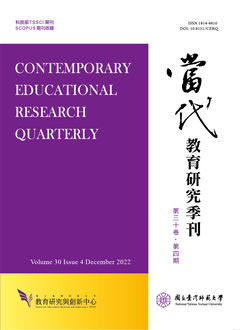

「詩人」就是「創作者」,這是Vico源自古希臘哲學獲得的啟示,其指出原始社會之領導者以「詩性能力」來創建社會,進而稱之為「神學詩人」。然而,Vico所賦予的「詩」之意涵中蘊含著開展存有、精湛技術及美感表現等三層意義,本文將之用於理解教師的教學活動,進而顯現了教學的藝術特質──開展學生內在的可能性、表現精湛的教學技術、獲得美感的教學經驗,並同時彰顯出,教學歷程中師生透過詩性心靈的互動所生成的意義。本文進一步指出,教師展現的詩性心靈特質包括:(1)擁有靈敏的氣質,以展現善解學生的實踐智慧;(2)擁有崇高的氣魄,以展現含納學生的恢弘器度;(3)擁有淑世的情懷,以展現關懷社會的教育理想;(4)擁有超越的勇氣,以展現創新教學的求好精神。並希望透過師生互動中的靈性感悟,來培育學生的詩性心靈。
''The poet is a maker,'' in Vico's thoughts, inspired from the ancient Greek philosophy, points out that leaders who were called ''theological poets'' are full of ''poetic faculty'' to establish their primitive societies, and he defines the poet with three connotations: unfolding the being, having masterly art and making aesthetics, which grasp three teaching points as follows: unfolding students' potentials, having masterly teaching art, and making the aesthetic teaching expression as well as disclosing the meaning of the poetic mind in teaching and learning. According to the above, this study points out that the teacher will demonstrate three kinds of poetic mind: first, to get a sensitive heart to acquire the practical wisdom for understanding every student; second, to hold a vigor for showing the extensive manner which could receive every students; third, to keep a salvational mood for bringing out the educational ideal to care for society; fourth, to possess courage to take the perfecting consciousness for innovating instruction; and in addition, to have a mind get the inward perception from teachers and students for educating students' poetic mind.

本著作係採用創用 CC 姓名標示-非商業性 3.0 台灣 授權條款授權.
本刊國立台灣師範大學教育研究與創新中心
106台北市和平東路一段162號 | 電話: 02-7749-3670 | E-mail: cerecerq@gmail.com
教創中心 | 師大 | 電子報 | 線上投審系統
本刊由國家科學及技術委員會人文社會科學研究中心補助經費
© 2014 CERI-NTNU
